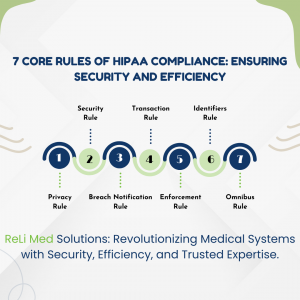How the 7 Types of HIPAA Rules Impact Your HIPAA-Compliant EMR Software?
Health care records are now stored online, and protecting private info has become a top priority. The HIPAA-Compliant EMR Software ensures compliance with the rules set by the HIPAA. These rules are very important to keep patient data secure. If health care workers do not follow these rules, they can face large fines and lose the trust of their patients. So, Explore how the 7 different types of HIPAA rules affect your EMR software.
Overview of the 7 Types of HIPAA Rules

Before understanding how these rules affect HIPAA-Compliant EMR Software, it is important to know what each rule means. Here are the 7 types of HIPAA rules that protect patient data:
- Privacy Rule: Protects the privacy of patient data. So, it ensures only people with permission can access sensitive Medical Records.
- Security Rule: Set strict rules to keep electronic health info safe. If encryption and proper data storage are missing, info can be exposed.
- Transaction and Code Set Rule: Requires all health care transactions to use the same formats and codes. Because of that, EHR software must be able to handle these formats smoothly.
- Identifier Rule: Gives unique identify numbers to patients, providers, and employers. This helps reduce errors and makes tracking easier in HIPAA-compliant EHR Software.
- Enforcement Rule: States the fines and punishments for not following HIPAA. So, regular audits and monitoring are necessary to avoid penalties.
- Breach Notification Rule: Ensures patients are told if their private data has been breached. If systems do not notify on time, patients can lose trust in the provider.
- Omnibus Rule: Updates privacy and security rules, especially for outside vendors. Because of that, Medical Billing Services needs to know the latest changes.
Essential HIPAA Guidelines for Designing Secure EMR Software
HIPAA-Compliant EMR Software must follow 7
to prevent problems like data leaks or fines. Each rule helps design better software. The Privacy Rule makes sure only the right people see patient data, using passwords and secure logins. The Security Rule keeps data safe with encryption and secure storage.
The Transaction Rule ensures health care workers use the right codes to prevent mistakes. The Identifier Rule gives each patient and provider a unique ID to avoid errors. The Enforcement Rule requires regular checks to follow the rules. The Breach Rule quickly informs patients if their data leaks. The Omnibus Rule requires updates to stay in line with the rules.
How Small Practices Can Achieve HIPAA Compliance?
For small health care practices, following HIPAA rules might feel hard, but it can be done by taking the right steps. First, invest in HIPAA-Compliant EMR Software that is designed to protect patient data and meet all HIPAA rules. Next, train your staff on these rules regularly because everyone needs to know how to handle sensitive info. However, it is also important to limit access to patient data. If access is not limited, people who shouldn’t see it can view private info. Make clear plans for handling data breaches and regularly check to ensure all rules are followed. This will help small practices stay HIPAA compliant and keep their patients’ trust.
Future of HIPAA and EMR Software: Trends and Predictions
As tech gets better, the future of HIPAA-compliant EMR Software will include smarter tools and new features. such as, AI can help detect and prevent security problems before they happen. Cloud-based software is also becoming more popular because it is secure and flexible for storing and managing data. But new tech, like telemedicine, may bring new rules. Because of that, EMR software must keep adapting to meet these new rules. So, health care workers need to invest in modern software to stay ahead of changes and follow HIPAA rules in the future.
Need Help Staying HIPAA Compliant? How ReLi Med Solutions Can Assist?
At ReLi Med Solutions, we know how difficult it can be for health care workers to follow HIPAA rules. That’s why our HIPAA-compliant EMR Software is designed to easily meet all the rules. With features like live alerts for data breaches, strong security tools, and simple access controls, our software makes sure your practice stays compliant. Whether you run a small clinic or a large health care facility, ReLi Med Solutions has the tools to protect your patients’ data and help your practice succeed with RCM solutions that make billing easier.
Conclusion
The 7 HIPAA rules help protect patient data and make sure health are workers follow the law. Using HIPAA compliant EMR Software helps you follow thecse rules and avoid problems. By learning these rules and using the right tools, you can stay safe and keep your patients’ trust. ReLi Med Solutions helps you follow all HIPAA rules while making your work easier and faster. Protect your patients and your practice with simple and reliable tools. Let ReLi Med Solutions make compliance easy for you.

